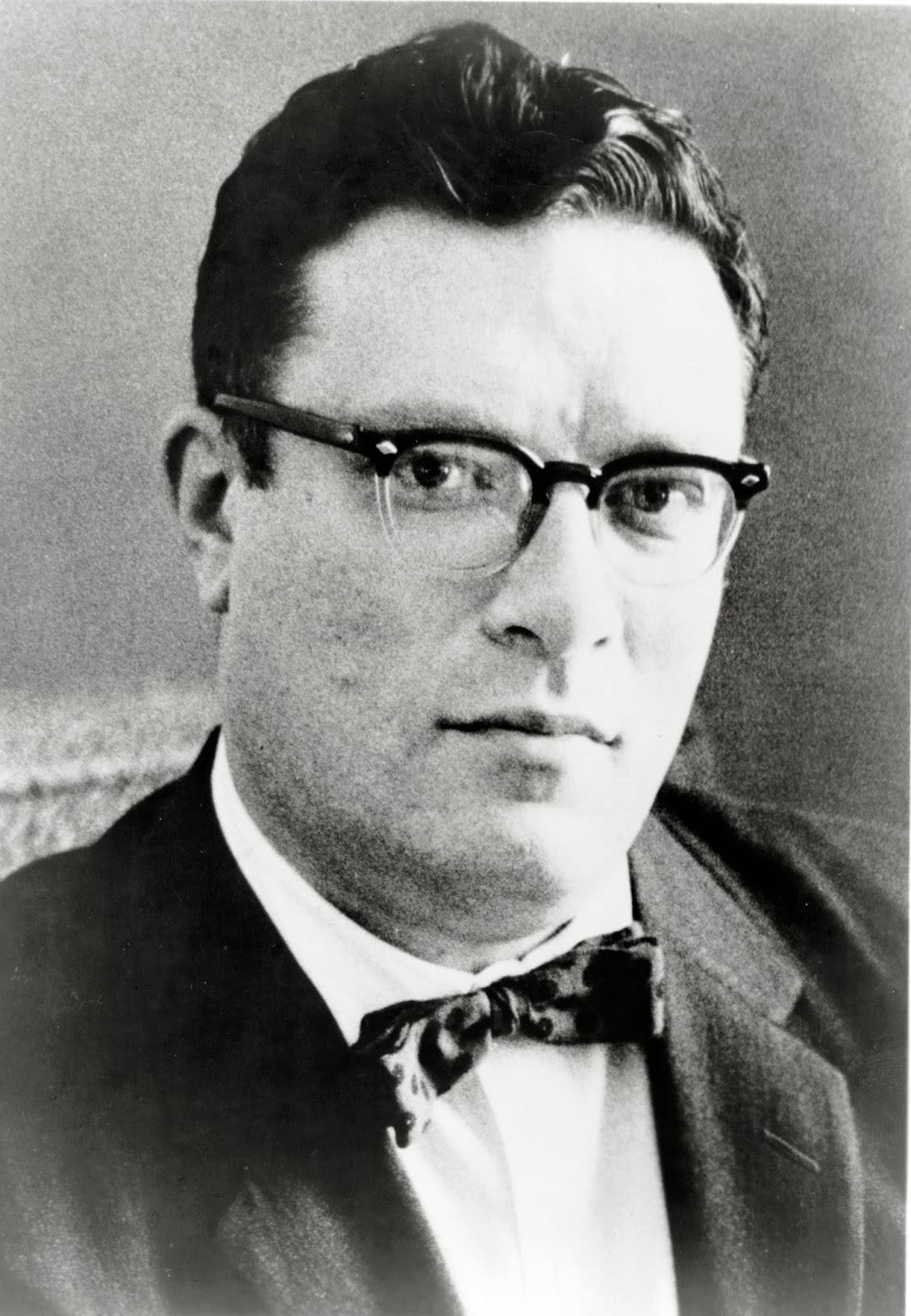RANDALL GARRETT'S REVIEWS IN VERSE: #1 Isaac Asimov's "Caves of Steel"
(First published The Original Science Fiction
Stories March 1956, copyright not renewed. Illustrated by Garrett himself.)
Many people today may not be aware of this brilliant, but short, series of parodies in verse that this undeservedly forgotten author penned in the mid-fifties.
(Warning, plot spoilers!)
In the future, when the towns are caves of steel
Clear from Boston, Massachusetts, to Mobile,
There's a cop, Elijah Baley,
who's the hero of this tale. He
Has a Spacer robot helper named Daneel.
For it seems that there's some guys from Outer
Space
(They're descendants of the Terran human race),
And all over Terra's globe,
it seems they're giving jobs to robots,
Which are hated by the people they replace.
 |
| Issue cover. |
So a certain Spacer, Sarton, gets rubbed out,
And the Chief says to Elijah: "Be a scout;
Go and find out just
whodunit, and, although it won't be fun, it
Will result in your promotion,
without doubt!"
The assignment puts Elijah on the spot.
He must
do the job up right; if he does not,
It not only will disgrace him, but the robot will
replace him
If the robot is the first to solve the plot.
In the city, there's a riot at a store.
R. Daneel jumps on a counter, and before
Baley knows it, pulls his blaster. Then he bellows:
"I'm the master
Here, so stop it, or I'll blow you off the
floor!"
So the
riot's busted up before it starts,
And Elijah's
wounded ego really smarts.
"Well," he
says, "you quelled that riot, but a robot wouldn't try it!
Dan, I think
you've got a screw loose in your parts!"
Baley
doesn't see how R. Daneel could draw
Out his
blaster, for the First Robotic Law
Says:
"No robot may, through action or inaction, harm a fraction
Of a whisker
on a human being's jaw."
Since Daneel, the robot,
has a human face,
And he looks exactly
like the guy from space
Who has been
assassinated, Mr. Baley's quite elated,
For he's
positive he's solved the murder case!
"The
Commissioner," he says, "has been misled,
'Cause there
hasn't been a murder! No one's dead!
Why
you did it, I don't know, but I don't think you are a robot!
I am certain
you are Sarton, sir, instead!"
"Why,
that's rather silly, partner," says Daneel,
"And
I'm awful sorry that's the way you feel."
Then,
by peeling back his skin, he shows Elijah that, within, he
Is
constructed almost totally of steel!
Well, of course, this
gives Elijah quite a shock.
So he thinks the whole
thing over, taking stock
Of the clues in their
relation to the total situation,
Then he goes
and calls a special robot doc.
Says Elijah
Baley: "Dr. Gerrigel,
This here
murder case is just about to jell!
And
to bust it open wide, I'll prove this robot's homicidal!
Look him
over, doc, and see if you can tell."
So the doctor gives
Daneel a thorough test
While the robot sits there, calmly self-possessed.
After
close examination, "His First Law's in operation,"
Says the
doctor, "You can set your mind at rest."
That leaves Baley
feeling somewhat like a jerk,
But Daneel is very
difficult to irk;
He just says: "We can't stand still, or we will
never find the killer.
Come on,
partner, let us buckle down to work."
Now the plot begins to thicken—as it
should;
It's the thickening in plots that
makes 'em good.
The Police Chiefs robot, Sammy, gives
himself the double whammy,
And the reason for it isn't
understood.
The Commissioner says: "Baley,
you're to blame!
Robot Sammy burned his brain out, and I claim
That, from every
single clue, it looks as though you made him do it!"
Baley hollers: "No, I didn't!
It's a frame!"
Then he says: "Commish, I think
that you're the heel
Who's the nasty little villain in this
deal!
And I'll tell you
to your face, I really think you killed the Spacer,
'Cause you thought he was the robot,
R. Daneel!"
The Commissioner breaks down and
mumbles: "Yes—
I'm the guy who did it, Baley—I
confess!"
Baley says:
"I knew in time you would confess this awful crime. You
Understand, of course, you're in an
awful mess!"
The Commissioner keels over on the
floor.
When he wakes up,
R. Daneel says: "We're not sore;
Since the crime was accidental, we'll be merciful and
gentle.
Go," he says in solemn tones,
"and sin no more!"
Then says Baley to the robot, with a
grin:
"It was nice of you to overlook
his sin.
As a friend, I
wouldn't trade you! By the Asimov who made you,
You're a better man than I am, Hunka
Tin!"













